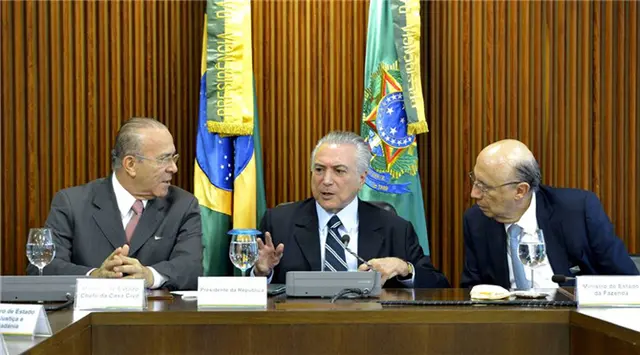After a third graft-related resignation this week, Brazil's interim government is trying to pull itself out of a mire which had already claimed two of interim President Michel Temer's closest aides.
Tourism Minister Henrique Alves became the latest senior official to lose his job over Operation Car Wash, an investigation into graft at state oil giant Petrobras.
Corruption has become a major concern of the new administration, which came to power on May 12, after President Dilma Rousseff of the left-leaning Workers' Party was suspended by the Senate pending an impeachment trial on charges of inflating public finances.
Evidence brought by an accomplice in the Petrobras corruption ring, Sergio Machado, former president of the state-owned Transpetro, have stoked the fires under Temer.
In the latest news to come out of Operation Car Wash, Sergio Machado revealed the names of 20 politicians from different political parties -- especially the now-ruling center-right Brazilian Democratic Movement Party (PMDB) -- who received bribes as part of the scheme, including Alves.
However, some local experts believed that a combination of political skill and strong support from Brazil's financial establishment are helping Temer ride the choppy waters.
Despite the successive corruption scandals, Temer is plowing forward with his belt-tightening agenda, including spending cuts and fiscal reforms unpopular with the people, but welcomed by the financial markets, according to political observer Ricardo Caldas, of the University of Brasilia (UnB).
What has saved this government is that it has been quick to react to the accusations, said Caldas, noting Temer is better at responding to such problems than Rousseff, who would leave it up to her team to handle complaints.
"Now, those who are accused have to step down. With this stand, Temer is succeeding in turning the denunciations against some of his political allies to his advantage," Caldas told Xinhua.
At the same time, Temer's government has also successfully directed media's attention to its economic strategy, led by Finance Minister Henrique Meirelles.
Other ministries may be affected by the corruption probe, but the economic team enjoys strong backing from the country's financial and business sectors.
According to Caldas, this week's scandal about Alvis won't be the last to rock Temer's young government.
"Certainly, there will be other accusations. In Brazil, it's not the future that is uncertain, but the past. Nobody knows what this or the other politician did years ago. The Car Wash allegations are pure dynamite, you can't predict where (the investigation) will end," said Caldas.
He also pointed out that none of the recent accusations will influence the impeachment trial against Rousseff, unless someone key to the process, such as Senate speaker Renan Calheiros, were to be suspended.
"If Renan goes, then the impeachment will begin to get shaky. That's why the government wants to speed up the process," said Caldas.
Rousseff denies any wrongdoing, and has said her trial aims in part to derail the corruption investigation.
"In principle, I believe Dilma will be impeached," said Caldas. "If the final vote were on Monday, I would say with certainty that yes, but (another) 45 days to go is a very long time, a lot of new developments can take place in that time."
(APD)
 简体中文
简体中文

